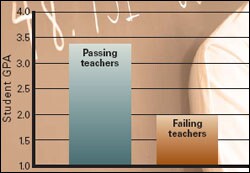A federally financed group says that teachers who go through its alternative-certification program could produce student outcomes equal to or greater than those of teachers who earn certification through traditional routes.
69´«Ă˝ whose teachers passed the ABCTE had higher cumulative grade point averages in math, reading, science, and social studies.

SOURCE: American Board for Certification of Teacher Excellence
The study from the Washington-based American Board for Certification of Teacher Excellence tested 55 veteran teachers from Tennessee who entered the profession through traditional routes.
Teachers completed the two exams needed for elementary education certification under the ABCTE’s Passport to Teaching program. They also provided their students’ state test scores.
Thirteen of the teachers passed the ABCTE exams, and 42 failed one or both. The study found that students of passing teachers had cumulative grade point averages of 3.36, while those of failing teachers had 2.0 GPAs.
Five states—Florida, Idaho, Pennsylvania, New Hampshire, and Utah—recognize Passport to Teaching. The program was started about 1½ years ago. David W. Saba, the president of the ABCTE, said that while 134 teachers have already been certified, it is too early to conduct such a study among them.
“This was a way to validate the exams,” Mr. Saba said, noting that although the number of teachers participating in the study was small, an analysis found it was statistically relevant.
“This is a first step in our efforts to ensure that everything we do has a lot of research behind it,” he said.
The ABCTE has also contracted with the Princeton, N.J.-based Mathematica Policy Research Inc. for a five-year study of the effectiveness of teachers certified through Passport to Teaching.




